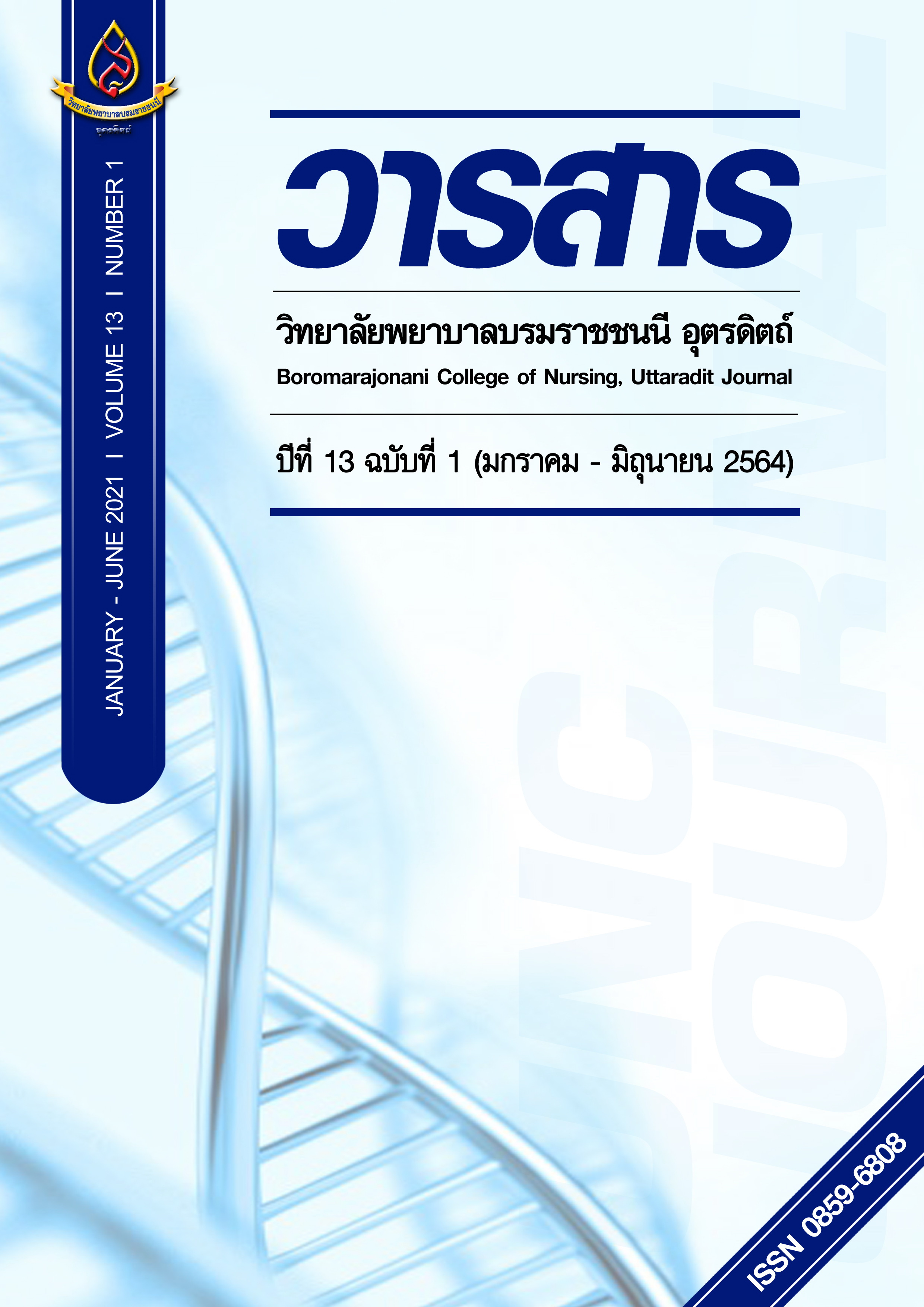ปัจจัยที่มีอิทธิพลต่อพฤติกรรมการเรียนออนไลน์ของนักศึกษาพยาบาล: ภาคเหนือตอนล่าง
Main Article Content
บทคัดย่อ
การศึกษาความสัมพันธ์เชิงทำนายนี้ มีวัตถุประสงค์เพื่อ 1) ศึกษาพฤติกรรมการเรียนออนไลน์ของนักศึกษาพยาบาล 2) ศึกษาปัจจัยทำนายพฤติกรรมการเรียนออนไลน์ของนักศึกษาพยาบาล กลุ่มตัวอย่างเป็นนักศึกษาพยาบาลในเขตพื้นที่ภาคเหนือตอนล่างที่เรียนออนไลน์ ที่ได้มาจากการสุ่มแบบชั้นภูมิ จำนวน 170 คน เครื่องมือที่ใช้ คือ แบบสอบถามออนไลน์ประกอบด้วย พฤติกรรมการเรียนออนไลน์และปัจจัยที่เกี่ยวข้องกับพฤติกรรมการเรียนออนไลน์ 7 ปัจจัย ได้แก่ การเรียนรู้จากการสังเกต การรับรู้ความสามารถของตนเอง การกำกับตนเอง แรงจูงใจใฝ่สัมฤทธิ์ เจตคติเชิงพฤติกรรม สิ่งแวดล้อม และการสนับสนุนทางสังคมที่ผ่านการตรวจสอบความตรงตามเนื้อหาจากผู้เชี่ยวชาญจำนวน 5 ท่าน ได้ค่าดัชนีความตรงตามเนื้อหาเท่ากับ .93, .94, .95, .90, .95, .96, .98 และ .98 ตามลำดับ มีค่าสัมประสิทธิ์อัลฟาของครอนบาค เท่ากับ .88, .97, .96, .95, .95, .97, .92, .93, .84 ตามลำดับ วิเคราะห์ข้อมูลโดยใช้สถิติเชิงบรรยาย ได้แก่ การแจกแจงความถี่ ร้อยละ ค่าเฉลี่ย ส่วนเบี่ยงเบนมาตรฐานและใช้สถิติเชิงอนุมานในวิเคราะห์การถดถอยพหุคูณแบบเป็นขั้นตอน ผลการวิจัยพบว่า
1) พฤติกรรมการเรียนออนไลน์ของนักศึกษาพยาบาลอยู่ในระดับมากที่สุด ( = 4.17, SD= .35)
2) ปัจจัยที่มีอิทธิพลต่อพฤติกรรมการเรียนออนไลน์ของนักศึกษาพยาบาลในเขตภาคเหนือตอนล่าง ได้แก่ การกำกับตนเอง การเรียนรู้จากการสังเกตและแรงจูงใจใฝ่สัมฤทธิ์ ซึ่งสามารถร่วมกันทำนายพฤติกรรมการเรียนออนไลน์ของนักศึกษาพยาบาลได้ ร้อยละ 63.60 อย่างมีนัยสำคัญทางสถิติที่ระดับ .01
Article Details
บทความหรือข้อคิดเห็นใดใดที่ปรากฏในวารสารวิจัยการพยาบาลและวิทยาศาสตร์สุขภาพ เป็นวรรณกรรมของผู้เขียน ซึ่งบรรณาธิการหรือสมาคมศิษย์เก่า ไม่จำเป็นต้องเห็นด้วย และบทความที่ได้รับการตีพิมพ์เผยแพร่ถือเป็นลิขสิทธิ์ของวารสารวิจัยการพยาบาลและวิทยาศาสตร์สุขภาพ
เอกสารอ้างอิง
Best, J. W. (1981). Research in education. (4th edition). Englewood Cliffs, New Jersey: Prentice Hall. Inc.
Boocha, P., Intarakamhang, U. & Tansuwannond, J. (2018). The causal relationship model of psychosocial factors affecting e-learning behavior of undergraduate student. Journal of Behavioral Science, 24(1), 83-101. (in Thai).
Boocha, P. (2018). Causal relationship model to develop an effective of psychosocial characteristics promotion program on the learning behavior of undergraduate students. (phd’s thesis), Srinakharinwirot University. (in Thai).
Faul, F., Erdfelder, E., Lang, A.-G., & Buchner, A. (2007). G*Power 3: A flexible statistical power analysis program for the social, behavioral, and biomedical sciences. Behavior Research Methods, 39, 175-191.
Faul, F., Erdfelder, E., Buchner, A., & Lang, A.-G. (2009). Statistical power analyses using G*Power 3.1: Tests for correlation and regression analyses. Behavior Research Methods, 41, 1149-1160.
Iamsupasit, S. (2007). Theory and techniques for behavior modification. (6th edition). Bangkok: Chulalongkorn University Press. (in Thai).
Mansukpol, W., & Jinangsuka, P. (2015). A Study of behavior and demands for using e-learning of graduate students Faculty of Education, Silpakorn University. Veridian E-Journal, Slipakorn University, 8(3), 347 – 358. (in Thai).
Ministry of Education Thailand. (2020). Notification of the Ministry of Education on the closure of Educational Institutions Affiliated with and under the Supervision of the Ministry of Education. Retrieved (2020, Mach 17) from https://www.moe.go.th/ให้สถานศึกษาในสังกัดแล. (in Thai).
Polit, D. F. & Hungler. (1999). Nursing research principles and methods (7th edition). Philadelphia: Lippincott Williams & Wilkins.
Thammametha, T. (2014). E-Learning: from theory to practice. Nonthaburi: Sahamit Pringting and Company Publishing Co., Ltd. (in Thai).
Thongmeekhaun, T., Saetiaw, S., Juntaveemuang, V., Kitrungrote, T., & Paenkaew, J. (2020).
Online social network using behavior among nursing students of Boromarajonani college of Nursing, Songkhla. Journal of Nursing, Siam University, 21(41). 67-77. (in Thai).


